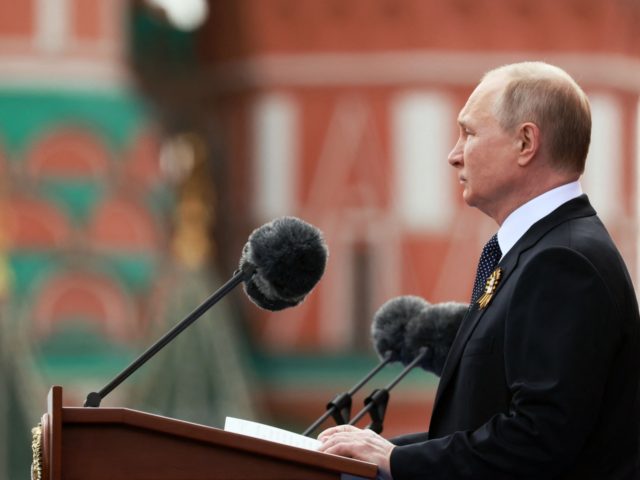China’s state-run Global Times salivated over Russian dictator Vladimir Putin’s Victory Day address on Monday, praising Putin’s “calm, restrained” demeanor as a firm rebuke to Western pressure against his invasion of Ukraine – but also sensing that Putin was “leaving some room for negotiation” by delivering a somnolent speech when something fierier had been anticipated.
May 9 is celebrated as “Victory Day” in Russia, commemorating the defeat of Nazi Germany in World War II. Hyper-nationalist Putin greatly played up the significance of the Victory Day holiday throughout his decades in power, raising expectations he would use his address this year to do something noteworthy about his war in Ukraine – anything from escalating hostilities with a formal declaration of war, to declaring “victory” so he could begin withdrawing from the surprisingly difficult endeavor.
Some observers thought the traditional Victory Day military parade might prove a bit embarrassing for Putin since so many of Russia’s troops and tanks are tied up in Ukraine, and quite a few of them will not be coming home.
In the event, the Russian army did manage to put on a fairly decent parade in Moscow, although it was noticeably smaller than last year’s, and nobody looking up at the bright blue sky believed the Kremlin’s excuse that the traditional fighter jet flyover had to be canceled due to “bad weather.”
Putin’s speech was surprisingly “low key,” as British analyst Nicholas Drummond put it. He repeated a few of his fanciful claims about NATO “surrounding” the Russian motherland, a threat that could only be neutralized through aggressive action.
Putin did not actually use the word “Ukraine” at all, although he did mention the rebellious Donbass region of Ukraine several times. He claimed the ethnic Russians living in Donbas require Moscow’s protection, asking his audience to pay silent respects to “the elderly, women and children of Donbas, peaceful civilians who died of merciless shelling, barbaric strikes of neo-Nazis.”

Russian President Vladimir Putin leaves Red Square after the Victory Day military parade in central Moscow on May 9, 2022. (KIRILL KUDRYAVTSEV/AFP via Getty)
“He avoids the word [Ukraine] because it is associated with trouble, defeat, thwarted hopes and expectations,” Ukrainian analyst Volodymyr Fesenko told Al Jazeera News.
Putin’s speech was padded with warmed-over anti-American talking points he has dispensed many times before, ranting against American “exceptionalism” and promoting Russia as a superior guardian of moral virtue.
“We will never give up our love for our Motherland, our faith and traditional values, our ancestors’ customs and respect for all peoples and cultures,” he ranted – an odd boast for a warmongering leader whose troops are currently filling mass graves with the bodies of Ukrainian civilians.
“Meanwhile, the West seems to be set to cancel these millennia-old values. Such moral degradation underlies the cynical falsifications of World War II history, escalating Russophobia, praising traitors, mocking their victims’ memory and crossing out the courage of those who won the Victory through suffering,” he wheezed, repeating decades-old Russian nationalist accusations that Western history undervalues Russia’s contributions to defeating Nazi Germany.
These passages of Putin’s address were not much different in spirit from his Victory Day 2021 address, in which Putin surprised even some Russian commentators by completely omitting European and American efforts to defeat the Axis, and stating that Russia faced Nazi Germany “alone.”

A screen shows Russian President Vladimir Putin giving a speech as servicemen line up on Red Square during the Victory Day military parade on May 9, 2022. (KIRILL KUDRYAVTSEV/AFP via Getty)
Putin’s surprisingly tepid Victory Day address led Western analysts to speculate he is politically weakened and adrift from the Ukraine war effort – apparently unwilling to escalate the conflict with a declaration of war and mass mobilization of Russian forces, but also not quite ready to pull his forces back to Donbas. Putin punted on the monumentally important Victory Day holiday.
“I think he is believing what he wants to believe – a slight shine of desperation,” British Defense Secretary Ben Wallace judged.
China’s Global Times, on the other hand, found the temperature of Putin’s address absolutely perfect:
Chinese analysts said that contrary to how the West had “demonized” Putin by speculating that he would formally declare a “war” against Ukraine or use the occasion to announce major targets, Putin did not mention Ukraine directly nor did he give any sign that the conflict would spill over into other countries, nor used fierce rhetoric to stir up any confrontational sentiments among the public and military in his speech.
Cui Heng, an assistant research fellow from the Center for Russian Studies of East China Normal University, told the Global Times that Putin explained his security concerns in the speech, as the unilateral expansion of NATO without caring about other countries’ security concerns had exacerbated the security situation in eastern Europe and provoked Russia’s reaction.
The Global Times hailed Putin for keeping a level head despite “growing pressure from the West,” including new U.S. sanctions and new Canadian military support for Ukraine, both announced on Sunday.
Chinese “experts” told the Global Times it was the West that must be feeling desperate, not Putin, since the flailing Biden administration is “facing huge pressure over a weakening domestic economy and hefty financial aid for Ukraine.”

COMMENTS
Please let us know if you're having issues with commenting.